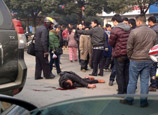
The central government may be well-intentioned when introducing these policies but they can easily become a hotbed for corruption. "Enterprises will get rewards if they meet certain standards, but businessmen have to 'give' something to get the rewards," said Cai, who is highly concerned about the future business climate for SMEs.
The local government charged an overhead levy, and didn't pay back irregularly charged fees, one businessman from Northeast China told Ye.
Most businessmen dare not expose this or take action to protect their rights because all their assets are involved, according to the businessman.
His views were echoed by Li Jianguo. The area where Li's enterprise located is managed by a single officer, in charge of collecting taxes, a typical structure in China. According to experts, this model gives too much power to revenue departments.
It has damaged credibility of the tax model. Speculators take the chance to pay less tax by bribing officials while honest businessmen face difficult condition caused by huge taxation bills, said Ye.
Legal overhaul needed
Tax collectors must continue to work until they have filled their quota. Currently in China, the tax quota for a new fiscal year is based on the tax collected in the previous year, after considering various possible factors which may influence taxation. These calculations can result in a situation not mirroring the economic facts on the ground.
Tax quotas should be made flexible instead of continuously being raised, so as to allow them to be consistent with overall economic conditions and the states of various enterprises. To do otherwise violates the rules of economics, said Liu Jianwen, a professor with the School of Law at Peking University.
Moreover, quotas are usually increased after orders conveyed down the government chain of command from the central government to provincial authorities, and then to city, county-level and lower departments.
Current laws related to taxation are far from enough, as most are merely administrative regulations, which do not have the same status as laws. "Flexibility is always there when administrative regulations are practiced, which leaves much room for corruption and bargaining," said Liu.
He suggests that the practice of taxation should be guided and governed by law instead of by tax collectors, adding that the local governments should change their concept from managing enterprises to serving them. "Both sides should clearly know what their rights and obligations are," said Liu.

















 A web user recently posted a photo of a twisted building in the suburb of Beijing, calling it "Tower of Large Intestine".
A web user recently posted a photo of a twisted building in the suburb of Beijing, calling it "Tower of Large Intestine".


![]()
